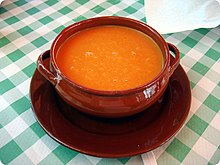gazpacho
Appearance
See also: Gazpacho
English
[edit]
Etymology
[edit]From Spanish gazpacho, perhaps via Mozarabic *gazpelağo from Latin gazophylacium (“treasure-chest in a church”), alluding to the diversity of its contents. Alternatively, related to Spanish caspicias (“remnants”).
Pronunciation
[edit]- IPA(key): /ɡəsˈpɑːt͡ʃəʊ/, /ɡəsˈpæt͡ʃəʊ/
Audio (Southern England): (file) Audio (US): (file) - Rhymes: -ɑːtʃəʊ
Noun
[edit]gazpacho (countable and uncountable, plural gazpachos)
- A cold soup of Spanish origin, made with olive oil, vinegar, bread and raw vegetables such as tomatoes, garlic, onion, cucumber and sweet peppers.
- 1850, William George Clark, Gazpacho: Or, Summer Months in Spain, page v:
- First, as to the title: Gazpacho is the name of a dish universal in, and peculiar to, Spain. It is a sort of cold soup, made of bread, pot-herbs, oil, and water. Its materials are easily come by, and its concoction requires no skill.
- 1885, Miguel de Cervantes Saavedra, chapter LIII, in John Ormsby, transl., The Ingenious Gentleman Don Quixote of La Mancha […] In Four Vols, volume II, London: Smith, Elder & Co. […], →OCLC, part I, pages 367–369:
- […] I’d rather have my fill of gazpacho than be subject to the misery of a meddling doctor who kills me with hunger, and I’d rather lie in summer under the shade of an oak, and in winter wrap myself in a double sheepskin jacket in freedom, than go to bed between holland sheets and dress in sables under the restraint of a government.
- 1904, L. Higgin, Eugène E. Street, Spanish Life in Town and Country[1]:
- He will eat a plateful of gazpacho or puchero, a sardine, half a roll of bread, and drink clear water as often as wine. Food is always of secondary importance: he ranks it after his novia, after his cigarillo, after the bulls.
- 1964, Jan Morris, “Plural Spain”, in Spain, Faber and Faber, published 2008, →ISBN:
- Seville is the home of gazpacho, a delicious cold soup of cucumber, tomato, and miscellaneous garnishings.
Translations
[edit]cold soup of Spanish origin
|
Further reading
[edit]Finnish
[edit]Etymology
[edit]Borrowed from Spanish gazpacho.
Pronunciation
[edit]Noun
[edit]gazpacho
Declension
[edit]| Inflection of gazpacho (Kotus type 1/valo, no gradation) | |||
|---|---|---|---|
| nominative | gazpacho | gazpachot | |
| genitive | gazpachon | gazpachojen | |
| partitive | gazpachoa | gazpachoja | |
| illative | gazpachoon | gazpachoihin | |
| singular | plural | ||
| nominative | gazpacho | gazpachot | |
| accusative | nom. | gazpacho | gazpachot |
| gen. | gazpachon | ||
| genitive | gazpachon | gazpachojen | |
| partitive | gazpachoa | gazpachoja | |
| inessive | gazpachossa | gazpachoissa | |
| elative | gazpachosta | gazpachoista | |
| illative | gazpachoon | gazpachoihin | |
| adessive | gazpacholla | gazpachoilla | |
| ablative | gazpacholta | gazpachoilta | |
| allative | gazpacholle | gazpachoille | |
| essive | gazpachona | gazpachoina | |
| translative | gazpachoksi | gazpachoiksi | |
| abessive | gazpachotta | gazpachoitta | |
| instructive | — | gazpachoin | |
| comitative | See the possessive forms below. | ||
Further reading
[edit]- “gazpacho”, in Kielitoimiston sanakirja [Dictionary of Contemporary Finnish][2] (in Finnish) (online dictionary, continuously updated), Kotimaisten kielten keskuksen verkkojulkaisuja 35, Helsinki: Kotimaisten kielten tutkimuskeskus (Institute for the Languages of Finland), 2004–, retrieved 2023-07-02
Polish
[edit]
Etymology
[edit]Unadapted borrowing from Spanish gazpacho.
Pronunciation
[edit]Noun
[edit]gazpacho n (indeclinable)
- gazpacho (cold soup of Spanish origin, made with olive oil, vinegar and raw vegetables such as tomatoes, garlic, onion, cucumber, and sweet peppers)
Further reading
[edit]- gazpacho in Wielki słownik języka polskiego, Instytut Języka Polskiego PAN
- gazpacho in Polish dictionaries at PWN
Spanish
[edit]
Etymology
[edit]Perhaps via Mozarabic *gazpelağo from Latin gazophylacium (“treasure-chest in a church”), alluding to the diversity of its contents, from Ancient Greek γαζοφυλάκιον (gazophulákion), from γάζα (gáza) + φυλάκιον (phulákion).
Alternatively, related to caspicias (“remnants”), which is a diminutive of caspa (“dandruff”).
Pronunciation
[edit]- IPA(key): (Spain) /ɡaθˈpat͡ʃo/ [ɡaθˈpa.t͡ʃo]
- IPA(key): (Latin America, Philippines) /ɡasˈpat͡ʃo/ [ɡasˈpa.t͡ʃo]
Audio (Peru): (file) - Rhymes: -atʃo
- Syllabification: gaz‧pa‧cho
Noun
[edit]gazpacho m (plural gazpachos)
Derived terms
[edit]Further reading
[edit]- “gazpacho”, in Diccionario de la lengua española [Dictionary of the Spanish Language] (in Spanish), online version 23.8, Royal Spanish Academy [Spanish: Real Academia Española], 2024 December 10
 gazpacho on the Spanish Wikipedia.Wikipedia es
gazpacho on the Spanish Wikipedia.Wikipedia es
Categories:
- English terms borrowed from Spanish
- English terms derived from Spanish
- English terms derived from Mozarabic
- English terms derived from Latin
- English 3-syllable words
- English terms with IPA pronunciation
- English terms with audio pronunciation
- Rhymes:English/ɑːtʃəʊ
- Rhymes:English/ɑːtʃəʊ/3 syllables
- English lemmas
- English nouns
- English uncountable nouns
- English countable nouns
- English terms with quotations
- en:Soups
- Finnish terms borrowed from Spanish
- Finnish terms derived from Spanish
- Finnish 3-syllable words
- Finnish terms with IPA pronunciation
- Rhymes:Finnish/ɑspɑtʃo
- Rhymes:Finnish/ɑspɑtʃo/3 syllables
- Finnish lemmas
- Finnish nouns
- Finnish terms spelled with C
- Finnish terms spelled with Z
- Finnish valo-type nominals
- Polish terms borrowed from Spanish
- Polish unadapted borrowings from Spanish
- Polish terms derived from Spanish
- Polish 3-syllable words
- Polish terms with IPA pronunciation
- Polish terms with audio pronunciation
- Rhymes:Polish/at͡ʂɔ
- Rhymes:Polish/at͡ʂɔ/3 syllables
- Polish lemmas
- Polish nouns
- Polish indeclinable nouns
- Polish neuter nouns
- pl:Soups
- pl:Spain
- Spanish terms derived from Mozarabic
- Spanish terms derived from Latin
- Spanish terms derived from Ancient Greek
- Spanish 3-syllable words
- Spanish terms with IPA pronunciation
- Spanish terms with audio pronunciation
- Rhymes:Spanish/atʃo
- Rhymes:Spanish/atʃo/3 syllables
- Spanish lemmas
- Spanish nouns
- Spanish countable nouns
- Spanish masculine nouns
- es:Soups

